In appreciation of Philip Seymour Hoffman.
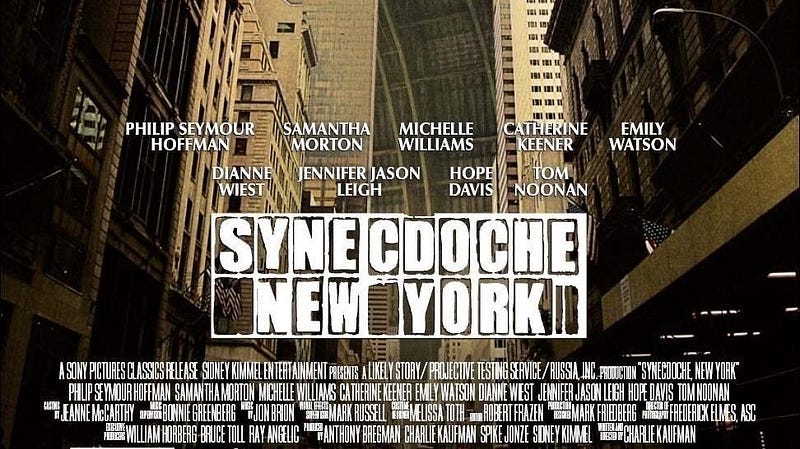
Born in New York on 23rd July 1967, Philip Seymour Hoffman was the archetypal and oft quoted “actor of his generation” and biased as I may be, boy does he deserve such an enduring moniker. Of the 63 acting credits listed against his Hall of acting Fame name, 52 were official theatrical releases of which I’ve seen 25 and written about 9. Whether it was a broken yet empathetic male nurse, a frustrated and angry salesman, a quirky and awkward PA, an equally awkward cameraman on the set of a porn film, a thundering master and cult like leader or here, a man living a life within a life and a play within a play, I’ve loved and admired all these and many more and his death at the cruelly young age of 46 in 2014 left a ginormous hole in his family, the wider film community of which he was a supportive grass roots influence, as well as the lives of us mere film fans.
Although his single Oscar success was a just reward for his incredible performance as writer Truman Capote in 2005, I’d argue he surpassed even this with his portrayal of “Lancaster Dodd” in the Paul Thomas Anderson directed masterpiece The Master in 2012 or indeed here as a man in the midst of an existential dread of a life on the verge of death.
Thanks for the memories.
Philip Seymour Hoffman (1967–2014)
Charlie Kaufman — Synecdoche, New York and Anomalisa
Originally published 9th March 2017 and as I adore these films I’ve given them a slimmer and trimmer update.medium.com
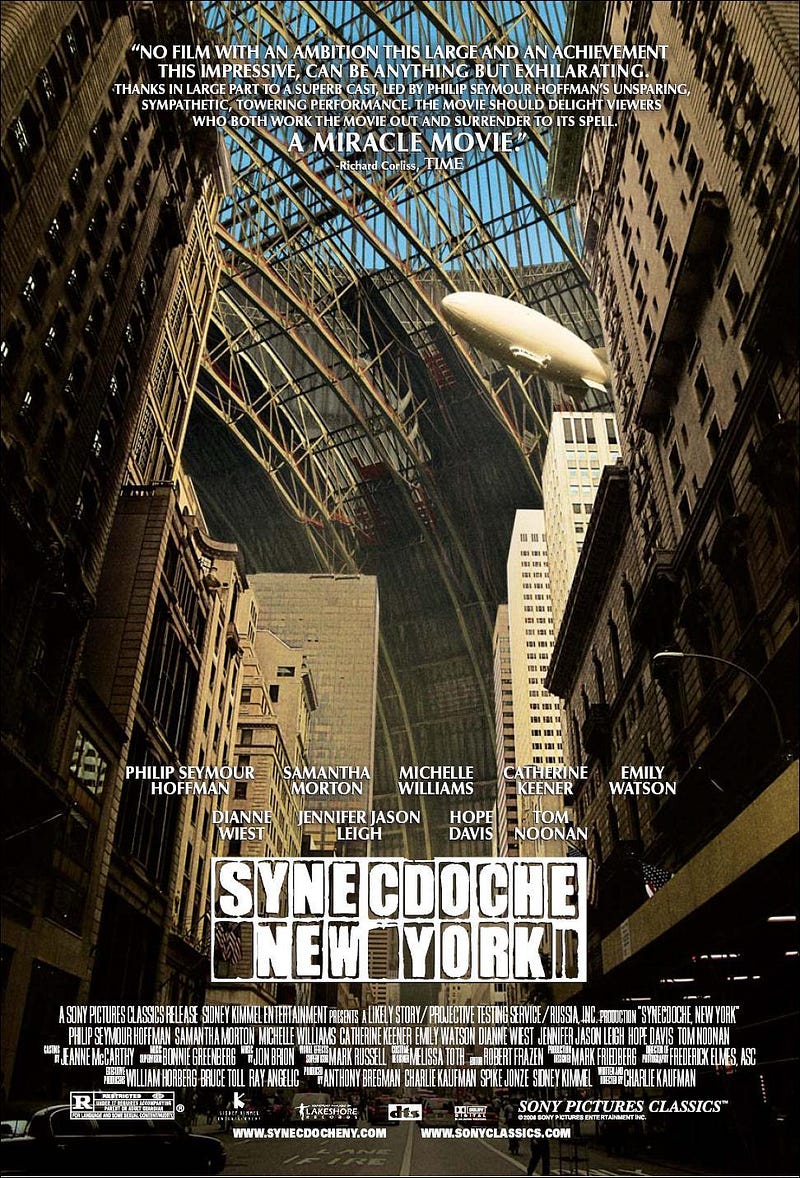
“I’ve told you before, it’s not a play about dating. It’s about death. Make it personal”.
Charlie Kaufman’s directorial debut is clearly many things. A labour of love for sure and a somewhat autobiographical tale of a man desperately seeking that truly unique piece of artistic creation. Equally Synecdoche, New York (a slight play on words as the film is set primarily in Schenectady, New York and that synecdoche means a part of something that represents the whole, and vice versa — a key theme of the film) has echoes of his screenplay for Being John Malkovich in 1999 and of a man in the midst of an existential crisis, pondering on the meaning of life, and the threat of death. The man in question is “Caden Cotard” and is brilliantly portrayed by Philip Seymour Hoffman in one of his best performances ever to hit the big screen.
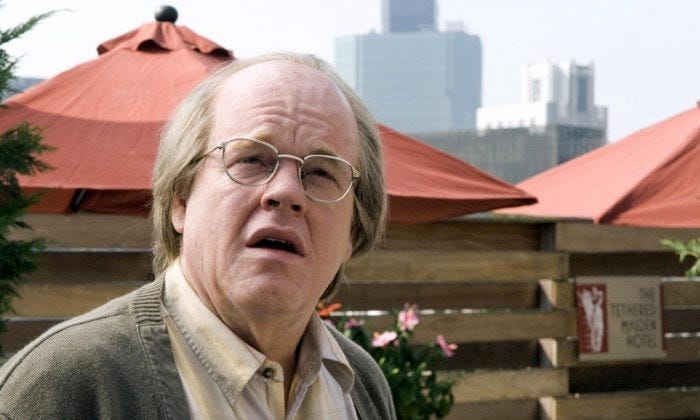
“Caden Cotard” (Philip Seymour Hoffman) Before and after playing Cotard here, consider these impressive roles portrayed by Hoffman: Scotty J in Boogie Nights, the incredibly sympathetic performance as Phil Parma in Magnolia, Truman Capote, Paul Zara in The Ides of March and the tour de force performance in yet another Paul Thomas Anderson film, The Master, as figurehead Lancaster Dodd. And in my humble opinion his performance here rates amongst the very best of his unfortunately short career. One of the greatest actors of our generation, he gives everything in his portrayal of Cotard as the film spans 30+ years of his life from 40 years of age onward until his death. Cotard is a hypochondriac theatre director seeking to leave the legacy of his lifetime, that one true piece of unique art that he will be remembered by. But from the very outset of the film we see and feel the angst within him.
“I don’t feel well” he proclaims early in the piece before we see him deteriorate in skin lesions and horrific visits to the toilet. In his mind, illness is everywhere and he’s constantly at odds with life, distressed by everyday occurrences, the television, junk mail and adverts and from a family that he is becoming more and more distanced from. Clearly experiencing an existential crisis, he is melancholic, cold even and too honest for his own good at times as he ponders the meaning of life and his mortality. Cotard is constantly surrounded by women and never fully able to engage, always missing and wanting someone that he can’t have. As a means of distraction maybe, he secures the ability to follow his dream by creating a self contained world in a vast warehouse that quickly resembles and very quickly escalates into a exact representation of his world and experiences, a play within a play and indeed a life within a life until the lines between fiction and reality blur to indistinguishable levels. All day every day is now spent “on set” with character doubles for every person within his life, even himself, with his mind fracturing piece by piece as he strives to continue his unique theatre art.
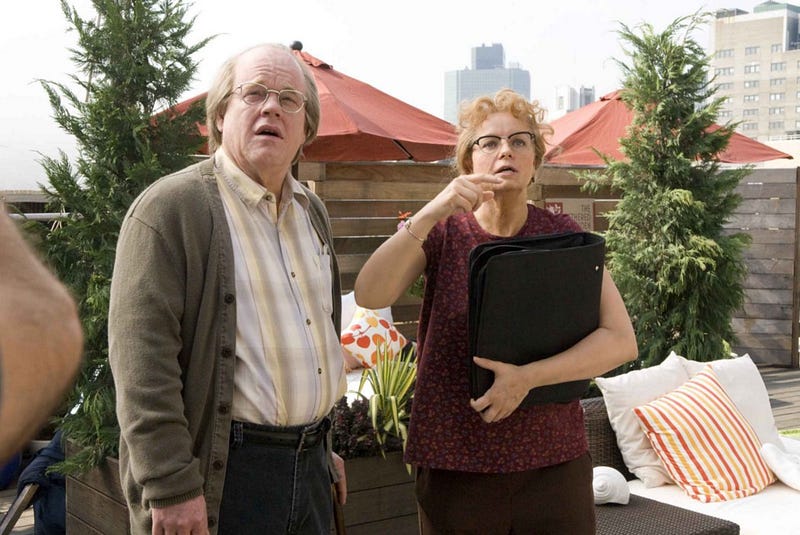
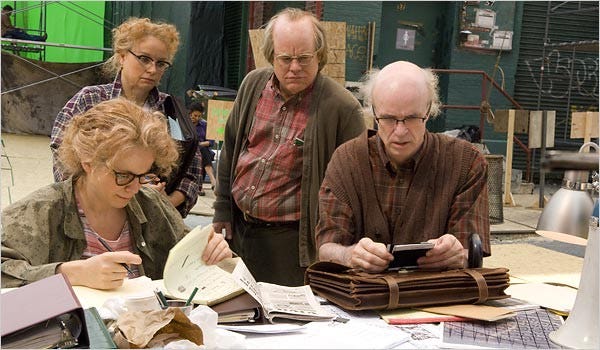
In a vast production such as this there are far too many characters and events to describe fully (and setting aside spoilers) the supporting cast are superb with each uniquely adding to this surreal film. Catherine Keener portrays Cotard’s first wife “Adele Lack” brilliantly, aloof and distant from Cotard and a polar opposite of his melancholic demeanour, she is a fellow artist also seeking that one unique art form opportunity who with the help of her best friend “Maria” (Jennifer Jason Leigh) soon tires of Cotard and his ailments and angst and moves to Berlin to further her artistic career. Now alone, Cotard spends significant time with perhaps the one true human being to cross his path and with whom he would finally fall in love but never truly have in his life. “Hazel” is brought to life magnificently by Samantha Morton in a sympathetic and empathetic role that truly draws you as the audience further into the film. Being a Charlie Kaufman film, naturally Hazel lives in a burning house! “I like it I do” proclaims Hazel on the house “But I’m really concerned about dying in the fire”. The joint scenes between Hoffman and Morton are the film’s true heart beat, yet truly heart breaking as long into their twilight years Cotard laments to Hazel “You’ve been a part of me forever. I breathe your name in every exhalation”.
With the play continuing with no end or indeed audience in sight, every member of Cotard’s life begins to be played within this “play within a play” structure by jobbing actors and this is never more striking than with “Sammy Barnathan” (Tom Noonan) who portrays Cotard himself. In an almost wraith like performance, Noonan is utterly compelling as he eerily admits “I’ve been following you for 20 years” and has learnt every aspect of Cotard before enacting what he’s learnt in real life. Sorry, within the play!
Are you as confused as I am?
With striking parallels to Kaufman’s previous writings and with an admitted autobiographical tone, Synecdoche, New York is soaked with further parallels to Shakespeare and a play within a play and of course “All the world’s a stage, and the men and women merely players”. But from a present day perspective it is perhaps more accurate to describe it as an existential exploration of the human condition, of death and decay within a fractured and schizophrenic mind trying to make sense of the world he cocoons himself away from. Every time I’ve watched this incredible debut film from Kaufman I’ve found the lead up to the denouement incredibly moving and difficult to watch, due in no small way to his lead actor’s stunning portrayal. The film can be a difficult watch at times, frustrating even, but I find it continually fascinating and intriguing which will always reward with repeated viewings.
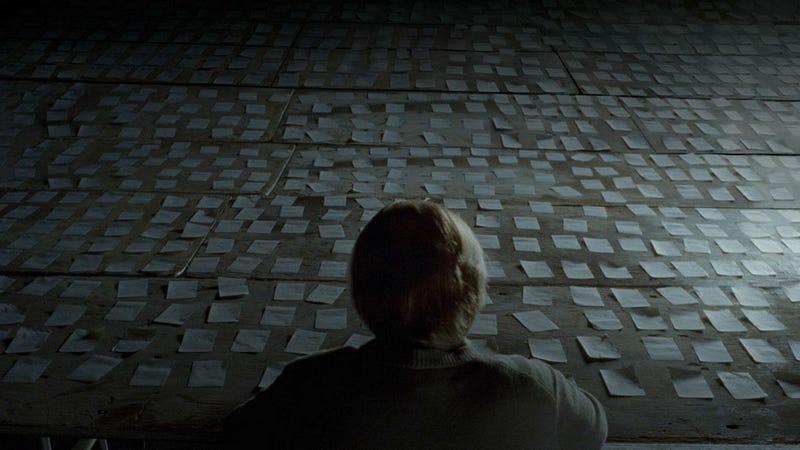
Thanks for reading. Just for larks as always, and always a human reaction rather than spoilers galore. My three most recently published film articles are linked below or there’s well over 200 blog articles (with 400+ individual film reviews) within my archives from which to choose:
“The Ides of March” (2011)
Pointed political drama that’s still a missed opportunity.medium.com
“Shame” (2011)
Heart breaking masterclass from Michael Fassbender.medium.com
“Being John Malkovich” (1999)
Spike Jonze incredible cinematic debut.medium.com



